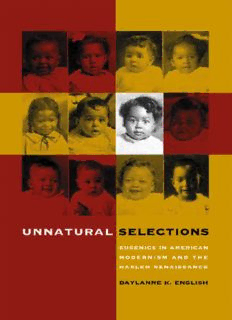
Unnatural Selections: Eugenics in American Modernism and the Harlem Renaissance PDF
Preview Unnatural Selections: Eugenics in American Modernism and the Harlem Renaissance
u n n a t u r a l s e l e c t i o n s u n n a t u r a l s e l e c t i o n s e u g e n i c s i n a m e r i c a n m o d e r n i s m a n d t h e h a r l e m r e n a i s s a n c e d a y l a n n e k. e n g l i s h The University of North Carolina Press \ Chapel Hill and London ©2004 The University of North Carolina Press All rights reserved Designed by April Leidig-Higgins Set in Mrs. Eaves by Copperline Book Services, Inc. Manufactured in the United States of America Publication of this work was aided by a generous grant from the Z. Smith Reynolds Foundation. The paper in this book meets the guidelines for permanence and durability of the Committee on Production Guidelines for Book Longevity of the Council on Library Resources. Library of Congress Cataloging-in-Publication Data English, Daylanne K. Unnatural selections: eugenics in American modernism and the Harlem Renaissance / by Daylanne K. English. p. cm. Includes bibliographical references (p. ) and index. isbn0-8078-2868-8 (cloth: alk. paper) isbn0-8078-5531-6 (pbk.: alk. paper) 1. American literature—2oth century—History and criticism. 2. Eugenics in literature. 3. American literature—African American authors—History and criticism. 4. American literature—White authors— History and criticism. 5. Modernism (Literature)— United States. 6. African Americans in literature. 7. Harlem Renaissance. 8. Race in literature. I. Title. ps228.e84e54 2004 810.9'3556—dc22 2003021778 cloth 08 07 06 05 04 5 4 3 2 1 paper 08 07 06 05 04 5 4 3 2 1 Chapter 1 has been adapted from “W. E. B. Du Bois’s Family Crisis,” American Literature72, no. 2 (June 2000): 291–319; copyright ©2000 Duke University Press. Chapter 3 originally appeared, in somewhat diVerent form, under the title “Gertrude Stein and the Politics of Literary-Medical Experimentation,” in Literature and Medicine16, no. 2 (1997): 188–209; copyright ©1997 The Johns Hopkins University Press. Used with permission of the copyright holders. i dedicate this book to the staff and patients of lynn community health center in lynn, massachusetts. their experiences and mine with them are the origin of this project. c o n t e n t s ix List of Illustrations xi Acknowledgments 1 Introduction 35 One. W. E. B. Du Bois’s Family Crisis 65 Two. T. S. Eliot’s Strange Gods: Celibacy, Hierarchy, and Tradition 93 Three. The Making and Delivering of Americans in Gertrude Stein’s Early Writings, 1903–1925 117 Four. Blessed Are the Barren: Lynching, Reproduction, and the Drama of New Negro Womanhood, 1916–1930 141 Five. New White Women: The U.S. Eugenic Family Studies Field Workers, 1910–1918 177 Conclusion 187 Notes 235 Bibliography 261 Index i l l u s t r a t i o n s 4 Eugenics Building at the Kansas Free Fair, 1929 12 Exhibit used at fitter families contests, 1920s 19 Examiners for a fitter families contest at the Michigan State Fair 31 Winners of fitter families contests at the Kansas Free Fair 48 “A teacher’s family,” Crisis, October 1916 50 NAACP “prize babies,” Crisis, December 1925 51 A prize baby, 1914 Children’s Number of the Crisis 51 Cover of the initial issue of the Crisis, November 1910 54 NAACP branch presidents, Crisis, January 1927 56 Wedding portrait of Mrs. Yolande Du Bois Cullen, 1928 58 Countée Cullen and ushers at his wedding to Yolande Du Bois 130 Playbill for Angelina Weld Grimké’s Rachel, 1916 150 Eugenics field worker training, 1910s 154 Letter from a volunteer collaborator to Charles Davenport, 1916 156 “Tenderness-Sympathy Test” for eugenics field workers in training, 1910s–1920s 164 Genealogical charts in The Kallikak Family(1912) 168 Deborah Kallikak, c. 1912 170 Kallikak family members, c. 1912
Description: